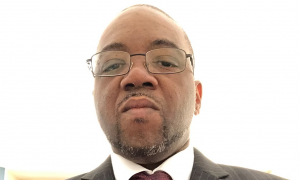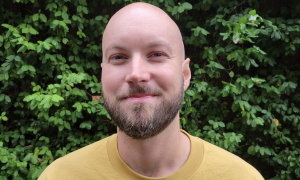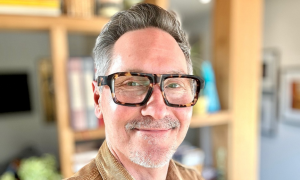Home » Jazz Articles » Chats with Cats » The Label Head: Nils Winther
The Label Head: Nils Winther

There are not that many independent companies left. Most of the ones doing good business are digging out old recordings instead of making new ones.
—Nils Winther
I got an insight by speaking with Nils Winther, owner of Steeplechase Records which is a family run business that has been around for over half a century. Nils began his career recording the early giants of jazz and has weathered all of the changes within the industry since that time. He's seen the ups and the downs, and the many formats of distribution come and go. He explained to me the difficulty of surviving in the age of streaming and social media.
About Nils Winther
Nils Winther was born in Denmark into a family of schoolteachers during the last phase of World War II in 1944 . His parents' aspiration was to bring Nils up to be a teacher as well, but young Nils had other interests and started to spend considerable time listening to jazz and going to clubs including the famed Jazzhus Montmartre to hear live jazz. While still a literature student at Copenhagen University's Graduate School Nils founded his jazz label SteepleChase in 1972. Since then, his life has been closely involved in the world jazz scene. Today at the age of 80 Nils is far from slowing down recording and is still releasing thirty to forty albums a year.All About Jazz: How did you first discover jazz?
Nils Winther: Ooh. My first jazz record I bought was in 1955 I think it was. I thought it was

Louis Armstrong
trumpet and vocals1901 - 1971

Lil Hardin Armstrong
piano1898 - 1971

Jelly Roll Morton
piano1890 - 1941
When I grew up in middle school, Dixieland jazz was very popular, the revival of New Orleans jazz, people like

George Lewis
tromboneb.1952

Bunk Johnson
trumpet1889 - 1949
My parents were schoolteachers and in order to become a teacher they had to play an instrument. They were both taught to play the violin, which I never liked. I thought it was so terrible when I heard them play. But then, one day I heard something on the radio that sounded really great. I liked it and my father said, "Do you realize that's a violin?" I said, "No."
That was

Svend Asmussen
violin1916 - 2017
AAJ: I read that you grew up with several instruments. ? Did you ever aspire to be a musician yourself or did you always want to work on the business side?
NW: No, to both questions. I really liked to play jazz. I was playing New Orleans jazz. I actually found some photographs from a long time ago of me playing with in a band with banjo, piano, and myself on trumpet.
I was never very good. My parents gave me a trumpet on the condition that I should take lessons from a Danish trumpet player who was a soloist with the symphony orchestra. He was a fantastic musician, but it was so boring. He had me playing all these rehearsals for trumpet from Arban's trumpet book—all the scales and all that stuff. I'd rather play along the Louis Armstrong records.
AAJ: So, how did you end up on the business side?
NW: It's a mistake [laughs]. It's a long story in fact. After graduating from high school I was in the army for two years (playing the bugle horn) and after that I studied Danish literature and French language at the University of Copenhagen. But, then I was studying jazz every night at Montmartre Jazz Club.
I went there the first time while I was in high school in the fall of 1962. I was so lucky, I saw

Bud Powell
piano1924 - 1966
I was spending a lot of time during the 1960s and early 1970s at the Montmartre Club and I got involved with the club booking musicians and taking care of their sound system. They were having a difficult time and we were helping them out doing unpaid work. Then I got a room upstairs with cables to the band stand. I had a tape recorder and a small portable mixer. Whenever I got the permission from the musicians I recorded the performances.
The American musicians who lived in Copenhagen at the time became good friends—people like

Dexter Gordon
saxophone, tenor1923 - 1990

Kenny Drew
piano1928 - 1993

Sahib Shihab
woodwinds1925 - 1989

Ben Webster
saxophone, tenor1909 - 1973
I have tons of unreleased tapes on the shelves in my office: like jam sessions with musicians passing through town, and not least with Dexter. Whenever a band came through town there would be a jam session and I would record it.
AAJ: So how did you take the next step and start a record label?
NW: Well, the great

Jackie McLean
saxophone, alto1932 - 2006

Horace Parlan
piano1931 - 2017

Red Mitchell
bass1927 - 1992
At the time, I had just received a grant to continue my studies at the University. There was enough money to press 500 LPs and that's what I did. It's amazing when I think back at it. It was 52 years ago. It was in 1972.
AAJ: Right. You've been in business for over fifty years and have seen so many changes in the music business. ?Can you tell me about the changes both good and bad from your perspective?
NW: Well, the best thing that ever happened to my business was when CDs came along. It was difficult to get CDs manufactured because there were so few factories. Then in 1985-1986 we and 4 other guys from the Danish music business invested in a building a CD pressing plant in Denmark. That proves to be a very good financial move, and in second part of the 1990s we got on the Danish stock exchange. That venture gave me financial freedom to work with the music and musicians I like to work with.
We had a company in Chicago in the first half of the 1980s. We were exporting LPs from Denmark, and also manufacturing some in Phoenix Arizona. When CDs came we could sell all we could manufacture, but as you may know, at the time LPs we distributed with full return rights, so in 1985 we were drowning in returns. It was terrible so we closed that distribution company.
AAJ: Besides formats, the rise of the internet and social media has changed everything.
NW: Yes, I think it is very bad. It is killing the music business. We're getting some income from digital sales, but although we have good distribution we're not getting enough money to do what we want to do. At the same time CD sales are down. Especially the last three to four years.
Vinyl is coming back for some reason. I don't understand it. Maybe I've lost my hearing but they don't sound nearly as good as CDs [laughs]. They never did. Now we are releasing some vinyl, but they are so expensive to do that we hardly make any money.
However, what happened in the 1980s really gave us the opportunity to do what we want to. I've basically been able to record the musicians I like to record. Some I can't afford and that's a shame. Some I would have liked to record. There were projects that never happened for one reason or another, projects I really wanted to do.
AAJ: Well, that leads into my next question. ?You've been doing this so long, is there anything you feel that's still left to do or anyone you still want to record?
NW: Here are a lot of great music and great musicians out there that I like to record. I just spent six days in a New Jersey studio recording music for new releases. The musicians are so good, and the music is great.
Nothing is wrong with jazz. There's a lot of it around. I'm currently looking ahead to five to eight sessions in February. We're releasing two or more new sessions and one vinyl per month (from our back catalog). You know, we have more than 1,200 titles in our catalog and it has always been my policy to have them all available. I don't know if we can continue doing that because we have so many CDs in stock in our warehouse in Denmark.
AAJ: Given the hard time labels are having, should musicians seek out a label or are they better off doing it themselves?
NW: I don't think they are better off doing it themselves. They are not getting the good distribution. SteepleChase is, basically, distributed worldwide. Some countries aren't really selling much, but we are here. We ship to about twenty countries when we have a new release, and we make the music available for press and radio. The music gets out there. That is what we can do that a New York musician cannot do by only selling at their gigs.
AAJ: What would be your advice then to musicians trying to get noticed by a label?
NW: Ha. I don't know. I can't tell you. I'm in South Carolina right now and since I came down here I've received eight or nine emails from musicians that have recorded their own product that want me to put it out. When I listen, I find that most of it is really good but what can I do?
We've created a label for musicians like that whose recordings are offered to us. We call it SteepleChase LookOut. This gives the new musicians a chance to get their music available for a larger audience. It's not a very great deal for the musicians but they get their music out. Many of them come back with more recordings, and I have offered to record some of them for the main label.
AAJ: I'm curious what you have to say about the jazz scene in Denmark. ?Is there a good scene there? ?Do they play differently than American musicians?
NW: There are a lot of great musicians in Denmark. They studied and some developed into very original players. Of course, you know Niels-Henning ?rsted Pederson, the Danish bassist who passed away a long time ago now. I did his first records in his own name before he joined

Oscar Peterson
piano1925 - 2007
Norman Granz
b.1918Then there's the guitarist

Pierre Dorge
guitarb.1946

John Tchicai
saxophone1936 - 2012

Johnny Dyani
bass1945 - 1986
AAJ: You've recorded so many giants of jazz. ?Is there a particular recording in your catalog that you're most proud of?
NW: I think the recording with

Chet Baker
trumpet and vocals1929 - 1988
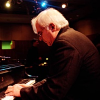
Paul Bley
piano1932 - 2016
I found Chet at a hotel in Gothenburg and flew him to Copenhagen. He missed his flight and then the next flight. Finally, I called the airport and said, "I'm looking for someone." The woman said, "I can't give you any names." I said, "It's a jazz musician I'm waiting for." She asked me, "Dexter?" She seemed to be one of Dexter's old girlfriends. "No, it's Chet Baker." She said, "I'm not allowed to give you any information but he just arrived." Then she gave him the message to take a taxi to the studio. Chet walked into the studio and was in a great mood and we did the record in about two and a half hours. It's outstanding music. That's one of my favorites.
There's also long list of Dexter Gordon recordings live from the Montmartre from the 1960s and the first half of the 1970s and recordings from

Archie Shepp
saxophone, tenorb.1937

Rich Perry
saxophone, tenor
Lee Konitz
saxophone, alto1927 - 2020

George Cables
pianob.1944

Eddie Henderson
trumpetb.1940
AAJ: I'm a guitarist and one of my teachers and early heroes was the great

Vic Juris
guitar1953 - 2019
NW: Well, I got to work with Vic Juris because of

Ron McClure
bassb.1941
AAJ: Yes, I did. ?Besides being such a great guy he was one of the best guitar players I've ever heard.
NW: Right. Yeah. I did a series of jam sessions in the studio and I had

Andy LaVerne
pianob.1947
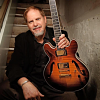
Dave Stryker
guitarb.1957

Tony Purrone
guitarAAJ: I'm not surprised. This is my last question. ?What do you think about the future of the jazz business?
NW: I don't know. What happens is that the big companies buy the small companies and they just sit on the material. I mean Blue Note is different but only slightly. They're somewhat active but mostly put out this edition or that edition of old recordings. I don't know what's going to happen. There are not that many independent companies left. Most of the ones doing good business are digging out old recordings instead of making new ones.
I'm sorry,

Bill Evans
piano1929 - 1980

Sonny Rollins
saxophoneb.1930
I like to give new artists the opportunity to record. A lot of musicians did their first recording in their own name for me. I can mention people like

Michael Carvin
percussionb.1944

Hilton Ruiz
piano1952 - 2006

Gary Versace
piano
Larry Willis
piano1942 - 2019

Allegra Levy
vocals
Idrees Sulieman
trumpetb.1923

Kevin Hays
pianob.1968
Tags
Chats with Cats
B.D. Lenz
Denmark
Copenhagen
Louis Armstrong
Jelly Roll Morton
George Lewis
Bunk Johnson
Svend Asmussen
Montmartre Jazz Club
Bud Powell
Niels-Henning ?rsted Pedersen
Stockholm
Dexter Gordon
Kenny Drew
Sahib Shihab
ben webster
Jackie McLean
Horace Parlan
Red Mitchell
Chicago
Phoenix
New York
oscar peterson
Norman Granz
Pierre D?rge
John Tchicai
Johnny Dyani
The New Jungle Orchestra
Chet Baker
Paul Bley
archie shepp
Rich Perry
Lee Konitz
George Cables
Eddie Henderson
Vic Juris
Ron McClure
Any LaVerne
Dave Stryker
Tony Purrone
Bill Evans
Sonny Rollins
Michael Carvin
Hilton Ruiz
Billy Gault
Gary Versace
Larry Willis
Allegra Levy
Idrees Sulieman
Mferghu
Anthony Ferrara
Kevin Hays,
Comments
PREVIOUS / NEXT
Support All About Jazz
 All About Jazz has been a pillar of jazz since 1995, championing it as an art form and, more importantly, supporting the musicians who make it. Our enduring commitment has made "AAJ" one of the most culturally important websites of its kind, read by hundreds of thousands of fans, musicians and industry figures every month.
All About Jazz has been a pillar of jazz since 1995, championing it as an art form and, more importantly, supporting the musicians who make it. Our enduring commitment has made "AAJ" one of the most culturally important websites of its kind, read by hundreds of thousands of fans, musicians and industry figures every month.
Go Ad Free!
To maintain our platform while developing new means to foster jazz discovery and connectivity, we need your help. You can become a sustaining member for as little as $20 and in return, we'll immediately hide those pesky ads plus provide access to future articles for a full year. This winning combination vastly improves your AAJ experience and allow us to vigorously build on the pioneering work we first started in 1995. So enjoy an ad-free AAJ experience and help us remain a positive beacon for jazz by making a donation today.

Copenhagen
Concert Guide | Venue Guide | Local Businesses
| More...


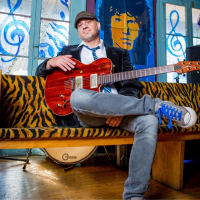
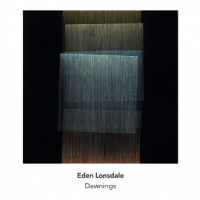



 Buy Now
Buy Now





